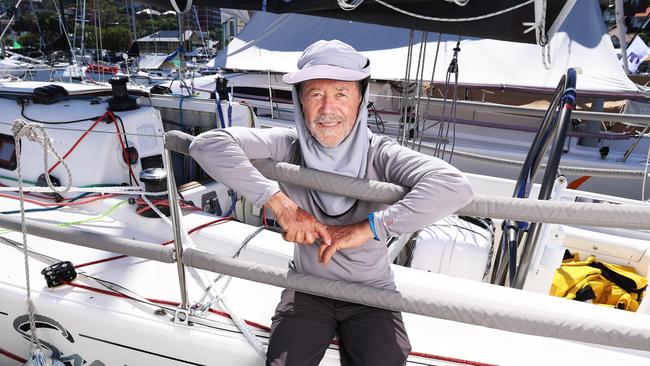From CT scans to seaside sailing: experimental cancer trial saved one man’s life and love for sailing
Michael Doherty’s adolescent years were a typical Australian story – always on the water, worrying only about the next wave. The one thing he wasn’t worried about: the southern sun.

When doctors last year discovered Michael Doherty had an aggressive form of skin cancer and told him he would need to remove a chunk of his face to stand a chance against it, the Sydney Hobart veteran’s passion for sailing became an afterthought.
Backed into a corner of grim options and bounced between hospital departments, Mr Doherty chanced upon groundbreaking Nobel Prize-winning immunotherapy at the Chris O’Brien Lifehouse.
Now cleared of cancer, Mr Doherty has embarked on his 22nd Sydney Hobart race as a crew member aboard Supernova.
“I approached last year’s Hobart with a huge sense of joy that I was physically able to do it, in as much as part of my face hadn’t been removed,” Mr Doherty said.
“I’ve got an even greater, refreshed appreciation of where I’m at approaching this year’s race.”
Having gone through a typical Australian adolescence, much of it spent at the beach not thinking about the dangers of the sun, in March last year Mr Doherty felt a lump just below his left ear. A biopsy revealed he had a common form of skin cancer called a squamous cell carcinoma.
After having the cancer surgically removed, he resumed sailing with a trip to deliver a boat from the Caribbean to Europe. “I was delighted with the invitation to go out there and do that sailing trip from Antigua to England,” he said.
“Very early in the trip, however, the lump that was cut out seemed to reappear. We had satellite email communications from the boat back to the surgeon who would just say ‘Look, it’s a complication due to the surgery or it’s a lump of haematoma, a build-up of fluid but not something worth worrying about’.’”
When Mr Doherty returned home six weeks later and had it checked, he was told that not only was the cancer back but it was now in an “advanced, aggressive” form.
Surgeons told him he would need surgery to remove his saliva gland, the nerves on the left side of his face and his left ear; even then they couldn’t guarantee he would be cancer-free. Dismayed by the prospect of losing part of his face, and with it his ability to sail, Mr Doherty turned his search elsewhere and discovered Chris O’Brien Lifehouse.
“I was offered to be a candidate on their trial and I thought about it really carefully: ‘Who’s the winner here? The trial? The statistics? Me? Is it really what’s best for me and not just the outcome of the trial?’
“Every question I asked about how I would go forward if things were right or wrong, everything was answered positively as to what the trial would offer me.”
Three days after his first treatment, Mr Doherty said there was a noticeable change. He was in less pain and could once again eat properly and move his jaw.
“I thought I can’t feel the pain I’m taking painkillers for, I was having to remind myself I had pain,” he said.
“This was three days after the first treatment.”
By his fourth treatment, there were no signs of cancer and no cause for surgical intervention.
He continued with the remaining 13 treatments taking him to June this year and has remained cancer-free. “Apart from not being able to put your glasses on … because you don’t have an ear, hearing the sounds of the boat, the sea, the communications, everything’s so important,” he said.
“All your senses are so important. I was, in a sense, revelling in appreciation of being wholesome and thankful for the fact that in my case, side effects were minimal.”
He has a new-found appreciation for the sport, as he embarks on this year’s race. “I can only sing a song of joy for what’s happened,” he said. “The opportunity that’s been given to me through the Chris O’Brien, they really have been my life house.”





To join the conversation, please log in. Don't have an account? Register
Join the conversation, you are commenting as Logout